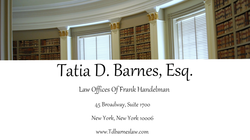|
Disclaimer: These codes may not be the most recent version. I make no warranties or guarantees about the accuracy, completeness, or adequacy of the information contained on this site or the information linked to any other site. Please check official sources.
New York
EPTL § 10-6.6 Exercise of a power of appointment Effect when more extensive or less extensive than authorized; trustee's authority to invade principal in trust. (a) An exercise of a power of appointment is not void because its exercise is: (1) More extensive than was authorized but is valid to the extent authorized by the instrument creating the power. (2) Less extensive than authorized by the instrument creating the power, unless the donor has manifested a contrary intention. (b) Unless the terms of the instrument expressly provide otherwise: (1) A trustee who has the absolute discretion, under the terms of a testamentary instrument or irrevocable inter vivos trust agreement, to invade the principal of a trust for the benefit of one or more proper objects of the exercise of the power, may exercise such discretion by appointing all or part of the principal of the trust in favor of a trustee of a trust under an instrument other than that under which the power to invade is created or under the same instrument, provided, however, that the exercise of such discretion (A) does not reduce any fixed income interest of any income beneficiary of the trust, (B) is in favor of the proper objects of the exercise of the power, and (C) does not violate the limitations of 11-1.7; and (2) A trustee described in subparagraph (1) of this paragraph may act thereunder without consent of any interested person and without prior court approval but is also authorized to seek such court approval, and the court having jurisdiction of the trust, upon the petition of the trustee and upon notice to all persons interested in the trust, may direct the trustee to exercise its discretion by appointing all or part of the principal of the trust in favor of a trustee of a trust under an instrument other than that under which the power to invade is created or under the same instrument, provided, however, that the exercise of such discretion (A) does not reduce any fixed income interest of any income beneficiary of the trust, (B) is in favor of the proper objects of the exercise of the power, and (C) does not violate the limitations of 11-1.7. (c) Unless the court upon application of the trustee otherwise directs, the aggregate annual and principal commissions of a trustee shall not be increased by its action under paragraph (b) of this section. (d) The exercise of the power to invade the principal of the trust under subparagraph (1) of paragraph (b) of this section shall be by an instrument in writing, signed and acknowledged by the trustee and filed in the office of the clerk of the court having jurisdiction over the trust; and a copy thereof shall be served on all persons interested in the trust (or on the guardian of the property, committee, conservator or personal representative of such persons or the parent or person with whom a minor resides), by registered or certified mail, return receipt requested, or by personal delivery or upon application of the trustee in any other manner directed by the court. (e) For the purposes of this section, the phrase "all persons interested in the trust" shall mean all the persons upon whom service of process would be required in a proceeding for the judicial settlement of the account of the trustee, taking into account section three hundred fifteen of the surrogate's court procedure act. (f) The exercise of the power to invade the principal of the trust under paragraph (b) of this section shall be considered the exercise of a special power of appointment as defined in 10-3.2 and shall be subject to the provisions of 10-8.1 and 10-8.2 covering the time at which the permissible period of the rule against perpetuities begins and the law which determines the permissible period of the rule against perpetuities. (g) The provisions of this section shall not be construed to abridge the right of any trustee who has a power of invasion to appoint property in further trust which arises under any other section of this chapter or under another statute or under common law. Disclaimer: These codes may not be the most recent version. I make no warranties or guarantees about the accuracy, completeness, or adequacy of the information contained on this site or the information linked to any other site. Please check official sources. |
|
Attorney Advertising. 2010 - 2024 All Rights Reserved |

